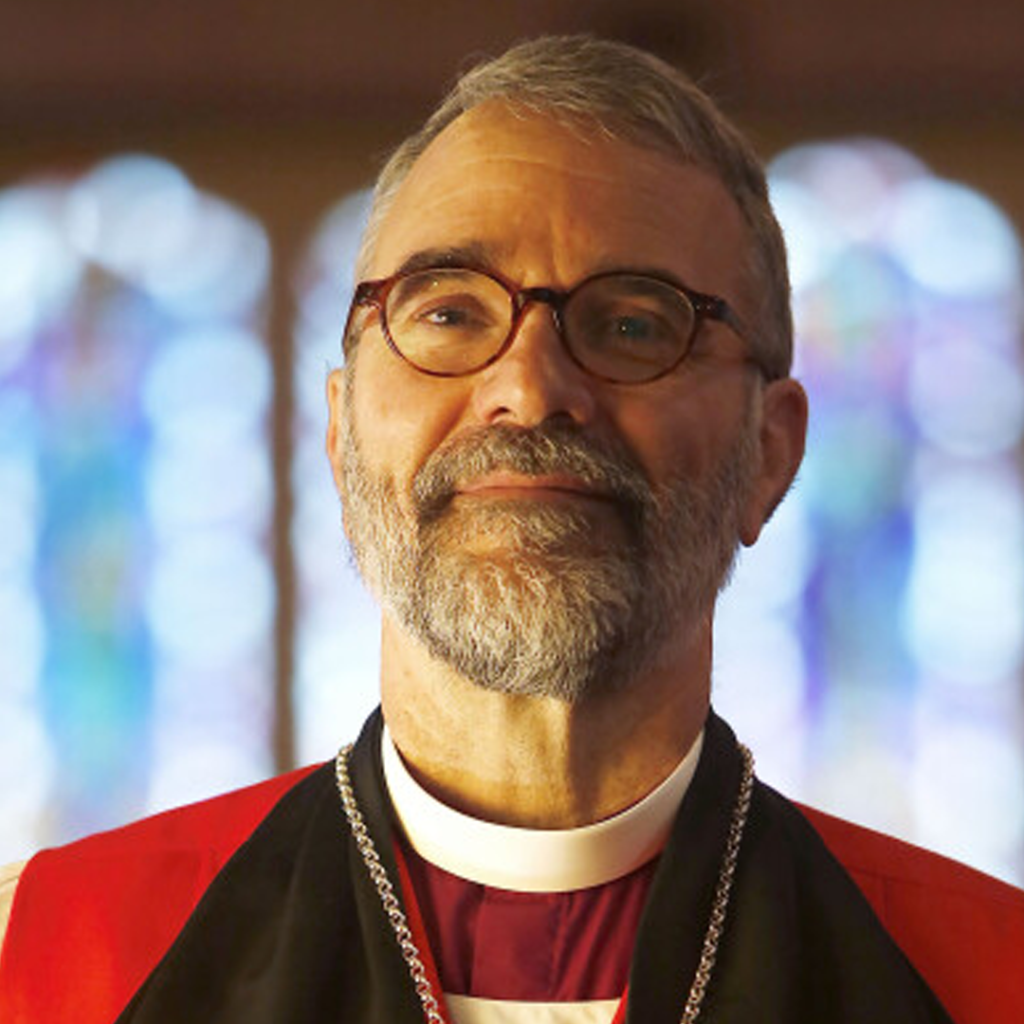Weekly Bulletin Inserts
Bulletin Insert: Week 1: Reflections on the Resurrection – April 24, 2022
During the Easter season, Sermons That Work is pleased to present reflections from bishops of The Episcopal Church on the resurrection of our Lord. Check back each week for a brief exploration of how Jesus Christ’s rising from the grave changes everything. To listen to this reflection, scan the QR code on this page and subscribe to the Sermons That Work podcast.

The Gospel for the Sunday after Easter tells us of Thomas who, famously, in his doubt, requires the certainty of touching His Lord’s hands and side before he will believe. The Lord does not rebuke him, though He does bless the later followers ready to believe without this evidence. But at the hearing of His Lord’s voice, Thomas, without touching, responds in faith: “My Lord and my God.” This is a reflection on these themes.
In chapter 15 of his first letter to the Church in Corinth, Paul tells us that if there is no resurrection of the dead, then “we are of all people most to be pitied” (v. 19). Apparently Eastertide is joyful, but also risky! God Himself is clearly not risk averse: witness how He enlists Adam, Abraham, Mary, etc. in risky missions with varied results. Likewise the risen Jesus Christ calls us His people to a risky following. In this vein, great modern philosophers have compared the life of faith to a gamble (Pascal) or a leap (Kiekegaard).
On the other hand, we who are “wearied by the changes and chances” of this life (Book of Common Prayer) quite reasonably come to church to rest in something that can be counted on, that is certain. Isn’t this what Jesus encourages us to do when he tells us to build our homes on rock and not sand (Matthew 7:24)? How do we balance the reality of risk and the longing for something certain? How can we conceive of this certainty that does not close off our minds and hearts?
In the thirteen century, Thomas Aquinas poses for himself this very question: is hope certain (Summa II/II, 18.4)? He answered “yes and no,” which may seem the kind of answer that gave scholastics a bad name! But it is what he means by “yes and no” which is helpful to us. Do we have a certain hope in Christ? Thomas replies that, insofar as we are doing the hoping, it is most uncertain, like everything about us. But insofar as it is Christ in whom we hope, it is utterly certain. By “certain,” he does not mean something that can be proved with a theorem, but rather he means that the One in whom we hope is trustworthy. “Certainty,” like faith, has a “fiduciary” dimension.
At the heart of the Christian life is being summoned anew by the news of the resurrection of Jesus. It does not depend on us, as if faith were some problem solved in our heads (though God does call us to faithful thinking), nor an exertion of our will (though He would have us love Him with all our wills). Rather we are continually turned away from our untrustworthy selves to our trustworthy Lord. As a result, I am given the gift of an uncertain certainty, by which, on the disciples’ path, beset by doubts, I am enabled to say, “My Lord and my God.”

This reflection, titled “Certain”, was written by the Rt. Rev. Dr. George Sumner, Bishop of Dallas. He has served, among other places, in central Tanganyika, Navajoland in The Episcopal Church, and as principal of Wycliffe College, Toronto. He has written a book on the relation of Christianity to other religions, a book on the theology of ordination, and a commentary on Daniel from a missiological perspective.
24 de abril de 2022 – Pascua 2 (C)
Semana 1: Reflexiones sobre la Resurrección
Durante el tiempo de Pascua, Sermones que iluminan se complace en presentar las reflexiones de obispos de la Iglesia Episcopal sobre la resurrección de nuestro Señor. Revise cada semana para una breve exploración de cómo la resurrección de Jesucristo de la tumba lo cambia todo.
El Evangelio del domingo después de Pascua nos habla de Tomás que, como es sabido, en su duda, requiere la certeza de tocar las manos y el costado de su Señor antes de creer. El Señor no lo reprende, aunque bendice a los seguidores posteriores que están listos para creer sin esta evidencia. Pero al oír la voz del Señor, Tomás, sin tocar, responde con fe: “Señor mío y Dios mío”. Esta es una reflexión sobre estos temas.
En el capítulo 15 de la primera carta a la Iglesia de Corinto, Pablo nos dice que, si no hay resurrección de los muertos, entonces “somos los más dignos de lástima de todos los pueblos” (v. 19). ¡Aparentemente el tiempo pascual es alegre, pero también arriesgado! Dios mismo claramente no es reacio al riesgo: vea cómo recluta a Adán, Abraham, María, etc. para misiones arriesgadas con resultados variados. Asimismo, Jesucristo resucitado llama a su pueblo a un seguimiento arriesgado. En este sentido, grandes filósofos modernos han comparado la vida de fe a una apuesta (Pascal) o a un salto (Kierkegaard).
Por otro lado, nosotros que estamos “cansados por los cambios e imprevistos” de esta vida (Libro de Oración Común) venimos razonablemente a la iglesia a descansar en algo con lo que se puede contar, eso es seguro. ¿No es esto lo que Jesús nos anima a hacer cuando nos dice que construyamos nuestras casas sobre roca y no sobre arena (Mateo 7:24)? ¿Cómo equilibramos la realidad del riesgo y el anhelo de algo seguro? ¿Cómo podemos concebir esta certeza que no cierre nuestras mentes y corazones?
En el siglo XIII, Tomás de Aquino se plantea esta misma pregunta: ¿es segura la esperanza (Summa II/II, 18.4)? Respondió “sí y no”, ¡lo cual puede parecer la clase de respuesta que le dio mala reputación a los escolásticos! Pero lo que él quiere decir con “sí y no” es lo que nos es útil. ¿Tenemos una cierta esperanza en Cristo? Tomás responde que, en la medida en que estemos esperando, es muy incierto, como todo lo que nos rodea. Pero si se trata de Cristo en quien esperamos, es absolutamente cierto. Por “cierto”, no se refiere a algo que se pueda probar con un teorema, sino que quiere decir que Aquel en quien esperamos es digno de confianza. La “certeza”, como la fe, tiene una dimensión “fiduciaria”.
En el corazón de la vida cristiana está el ser convocado de nuevo por la noticia de la resurrección de Jesús. No depende de nosotros, como si la fe fuera un problema resuelto en nuestras mentes (aunque Dios nos llama a un pensamiento fiel), ni depende de un ejercicio de nuestra voluntad (aunque Él quiere que lo amemos con toda nuestra voluntad). Más bien somos continuamente orientados de nuestro ser indignos de confianza hacia el Señor digno de confianza. Como resultado, se me da el don de una certeza incierta, por la cual, en el camino de los discípulos, acosado por las dudas, puedo decir: “Señor mío y Dios mío”.

Esta reflexión, titulada “Cierto”, fue escrita por el Rvdmo. Dr. George Sumner, obispo de Dallas. Ha servido, entre otros lugares, en central Tanganyika, Navajoland en la Iglesia Episcopal, y como director de Wycliffe College, Toronto. Ha escrito un libro sobre la relación del cristianismo con otras religiones, un libro sobre la teología de la ordenación y un comentario sobre Daniel desde una perspectiva misionológica.
Don’t forget to subscribe to the Sermons That Work podcast to hear this sermon and more on your favorite podcasting app! Recordings are released the Thursday before each liturgical date.
Receive Free Weekly Sermons That Work Resources!


